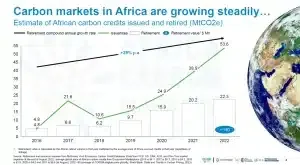The value of the global carbon credit market has experienced exponential growth, reaching a historic high of $909 billion in the past year. This surge underscores the increasing significance of carbon trading as a mechanism for mitigating climate change and fostering sustainable development worldwide.
Africa, a continent endowed with abundant green energy resources, is strategically positioned to leverage its potential within the global carbon credit economy. Recognizing the opportunity, African nations are keen to enhance their participation in carbon trading to finance critical development projects and foster economic growth while contributing to global climate efforts.
However, Africa faces numerous challenges in effectively combating climate change and transitioning to green energy. These challenges include limited access to financing, inadequate infrastructure, and technological gaps. To address these issues, global stakeholders within the United Nations Framework Convention on Climate Change (UNFCCC) have committed to supporting developing nations like those in Africa. This support encompasses financial assistance, infrastructure development, and technological transfer to bolster climate resilience and advance sustainable development initiatives across the continent.
Through collaborating with international partners and leveraging its renewable energy potential, Africa aims to not only strengthen its position in the global carbon credit market but also to spearhead sustainable development efforts that benefit both its population and the planet. Through strategic initiatives and partnerships, Africa can unlock its immense potential as a key player in shaping the future of carbon trading and climate action on a global scale.
The graph shows the projected growth of the African carbon market.
Source: The Rockefeller Foundation
The African continent aims to maximize its carbon credit economy with the of launch the African Carbon Markets Initiative (ACMI). The key objectives are:
- boost carbon credit potential,
- increase access to clean energy
- promote sustainable development
- create job opportunities in the country
ACMI has etched a roadmap to dramatically expand Africa’s participation in the voluntary carbon credit market. Each initiative defined above has a budget outline, carbon credit value, and revenue target.
ACMI’s Bold Action Plan for Africa’s Carbon Market
The existing funding for Africa’s energy transition falls significantly short of the necessary amount. Thus, ACMI’s goals are essential to transform the financing landscape of the continent.
ACMI’s prime target is to generate 300 million carbon credits and unlock 6 billion annual revenues by 2030. By 2050, ACMI is targeting over 1.5 billion annual credits, leveraging over $120 billion and supporting over 110 million jobs.
ACMI has collaborated with the Integrity Council for the Voluntary Carbon Market (IC-VCM) and the Voluntary Carbon Markets Integrity Initiative (VCMI) and is exploring the local carbon markets to produce high-integrity carbon credits. Not only this, it’s actively working with some of the leading carbon credit buyers like Standard Chartered, Nando’s, and Exchange Trading Group.
The ACMI also believes that the voluntary carbon market can succeed with people’s trust in carbon credit policies and its purpose to bring a positive impact on the environment and livelihood of Africans.
Several African nations, including Kenya, Malawi, Gabon, Nigeria, and Togo, have volunteered to partner with ACMI to expand carbon credit generation. According to a market survey, these 7 countries collectively have the potential to produce < 300 million metric tons of CO2 equivalents.
To support this move, H.E Yemi Osinbajo, Vice President of Nigeria and ACMI said,
“Carbon markets can deliver tremendous benefits for Nigeria and Africa—creating jobs, driving green investment, and reducing emissions. Nigeria is putting the groundwork in place today so that in subsequent years, carbon credits become a major industry that will benefit our people.”
Africa’s Path to Prosperity: Harnessing the Green Opportunities
As discussed before, improving global collaboration on climate change, increasing Africa’s resilience to climate shocks, and employing locals are the pathways to Africa’s prosperity. Its vast renewable energy resources, both solar and wind, and the carbon sinks form the backbone of its economy.
The ACMI focuses on climate projects needed for Africa’s green energy transition. Some of them are reforestation, forest conservation, renewable energy investments, carbon-storing agricultural practices, and direct air capture. Investors receive carbon credits as offsets for their ongoing emissions by funding climate initiatives.
The International Renewable Energy Agency (IRENA) has estimated Africa’s solar photovoltaic (PV) technical potential is at 7,900 GW.
This makes the continent one of the world’s highest generators of solar power. Noteworthy, North Africa receives more than 2,000 hours of sunshine per year.
From reports, we found out that U.S.-based Husk Power has raised $103 million to build at least 1,400 mini-solar grids in rural Africa and Asia. The firm has captured the solar market in Nigeria, hitting the petrol and diesel industry hard.
This move clearly shows that fostering renewable energy in Africa could diminish dependence on fossil fuels and cut CO2 emissions. It could open avenues for economic growth, job opportunities, and poverty alleviation.
Here’s an interesting graph depicting Africa’s dominance in solar power over the rest of the world.




